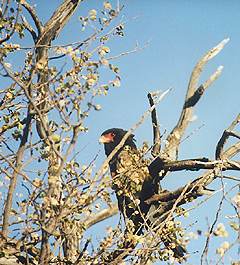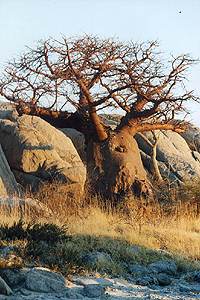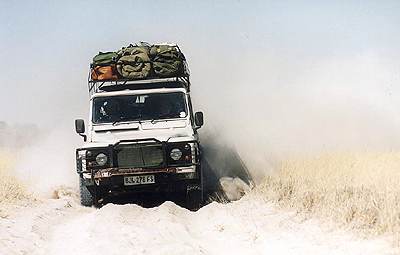|
Secrets
of the Makgadikgadi
Day 2:
We awake, still cold from the previous night.
We break up camp quickly and set off, further north, approaching
the long haul to the Makgadikgadi Pans, the largest salt pans in the
world.
The soul of Botswana is as timeless as ever as we plough on through sand, rich in cream-coloured granules, spotted with forests of thorn and exotic dry bushes bearing bright berries.
At first, the severe openness of the environment contrasts sharply with
our memory of crowds and peak time activity. We are still not part of
our surroundings, we still feel like intruders.
Now we are alone on a sand road that would not warrant a second glance
from a slick traveller. We spot a whitebacked vulture, protecting its nesting tree with a certain aloofness.
Further on, after many small villages where the locals, sand, poverty
and faith have blended together into a fragile harmony, we suddenly halt for a sight so rare that its memory is here now, tactile, breathless,
as it was then, the moment we saw it.
 Resplendent
in chestnut brown, black, red and silver grey, two bateleur eagles are perched barely 10m from the road, watching us with the knowledge that they belong here. We are the trespassers. Resplendent
in chestnut brown, black, red and silver grey, two bateleur eagles are perched barely 10m from the road, watching us with the knowledge that they belong here. We are the trespassers.
We drive through another village where the secrets of these hardened
people's survival tactics remain an enigma - what do they eat here in the hot dryness? What do they drink when they are thirsty?
An inebriated man stumbles towards the Land Rover as we check directions,
and begs.
"I am hungry," he says, speaking of a different hunger than our hunger for discovery. Wide-eyed, runny-nosed children crowd the vehicle, begging
for sweets.
Here, they crave the very things we have tried to escape from.
We drive on. The distance has been far and the heat and dust are omnipresent.
It is latish afternoon and we plough on through a sea of yellow grass.
We have been driving a solid 10 hours, and are craving some rest.
The grass sea takes its time as it makes way for the Makgadikgadi. Covered
in a deceptive crust of salt, the endless grey-white lies before us,
a small light from a camper's fire in the distance at Kubu Island our
beacon.
Here, stories abound of reckless 4x4 drivers who have left the hard
surface of the road and had been sucked into the depths of the salty mire. Another
African legend? Perhaps not. Back home we verify these statements, and
hear even more marrow-chilling tales.
Kubu Island is a freak of proportion, jutting out from the flatness around it in a strange fashion. It offers a view over the pans that are stretching as far as the eye can see.
 We
camp at the base of the island, near a baobab tree, one of several century-old residents on the island. We
camp at the base of the island, near a baobab tree, one of several century-old residents on the island.
A braai under the African skies cannot be imitated on a patio, we realise as we stand around the warm fire. Our talk is muted in the silence of the pans. Hunting stories are told, days of yesteryear are taken
out and polished and told around the fire.
We cannot wait to see the sun rise over the flat white surface the next
morning, but sleep is a stealthy partner and visits us all early in the night.
Day 3:
The majestic desolation of Makgadikgadi is accentuated as the sun rises
over the expanse of crust.  With no smog or smoke for miles around it, this is sunrise as it was on the first day of Creation. With no smog or smoke for miles around it, this is sunrise as it was on the first day of Creation.
Have you seen the sun, liquid, translucent, bitterly red hot at dawn, baking down on salty earth? Makgadikgadi will let you experience this - every morning, for as long as the sun will rise.
We drive through
acres of dust, powdered so fine that it has crowned everything around
it in shades of khaki.

The "nothingness" that the eye informs one of, is deceptive. Within the dry bushes and trees,
beyond the hot road and the skyline, life prospers its rich diversity.
This road away from Makgadikgadi is functional. It starts stripping
away our trappings and illusions and forces us to look deeper, look
beyond. Africa, you are training my eye to look - and not just look,
but see.
Chastened by our inability to deal with the elements, we arrive at Audi
Camp in Maun. Our legs are stiff, our drinking water has to be replenished.
Camp Audi, situated on the brink of the Thalamakane River, has a jovial,
continental atmosphere. As we pull in, grey with dust as all the other
vehicles there, we hear the lilt and laugh and gossip of many languages. Here, people from across the world have come together on
this night to sleep over at this gateway to the true wilds of Botswana.
Mince, spaghetti, beetroot and potato salad has seldom tasted as welcome.
Even the filthy restrooms with their makeshift reed walls do not
deter us as we languish under warm showers and sleep like kings who
have won a war.
Day 4:
Overnight, the water has come. For this part of Botswana and its inhabitants,
the coming of the water, seeping into the lower delta area, is as life-giving
as the moody Nile's gift is to the Egyptians. Yesterday, when we crossed
the Thalamakane River, small, stale pools of water lay evaporating in
the sun. Today, the water is here. We drive into Maun to get supplies
(and a rather salty tasting burger from the local Steers) and when we
return to camp, more water has seeped in, filling up the belly of the
dry riverbed.
A quick swim and we drive on, through Ngamiland, to Moremi, the first
of our stopovers in the internationally renowned national reserve.
Along the way, in one of the several concession areas, we see some elephant dung, the first signs of this pachyderm that
has found refuge in Botswana's open lands.
Mopane forests, leafless in their winter robes, their floors strewn with seed pods from thorn-trees, and the smell of lukewarm sand dress this part of Africa in its splendour.
A member of the "Big Six", the lappetfaced vulture, is perched in a thorn-tree. A good omen - because shortly after this, minutes after we have entered Moremi and climbed onto the roof of the Rover to see better, we spot the first grey giants of the Mopane forests. The elephants take no real
notice of us, but gently gather their young and wander off deeper into the bush.
The sand indicates that leopard and lion have walked the very road we are driving on.
That night, in camp, we hear hyaenas and see the beautiful Meyer's parrot in the trees above the tents.
* Interested
in experiencing Botswana?
Contact "We Shall See Safaris" at
+27 (0)82 5537 385 or +27 (0)51 4363686.
back to archive articles
|

